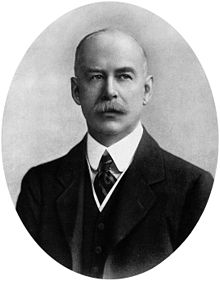Alfred Keogh
| Sir Alfred Henry Keogh | |
|---|---|

Sir Alfred Keogh
|
|
| Born |
3 July 1857 Dublin, Ireland |
| Died | 30 July 1936 (aged 79) London, England |
| Allegiance |
|
| Service/branch | British Army |
| Years of service | 1880–1910 1914–1918 |
| Rank | Lieutenant General |
| Commands held |
Director General Army Medical Services No. 3 General Hospital |
| Battles/wars |
Second Boer War First World War |
| Awards |
Knight Grand Cross of the Order of the Bath Knight Grand Cross of the Royal Victorian Order Companion of Honour Knight of Grace of the Venerable Order of Saint John Grand Officer of the Order of the Crown (Belgium) Grand Officer of the Legion of Honour (France) Grand Officer's Cross of the Order of the White Eagle (Serbia) |
| Other work | Rector of Imperial College London (1910–22) |
Lieutenant General Sir Alfred Henry Keogh GCB, GCVO, CH (3 July 1857 – 30 July 1936) was a medical doctor in the British Army. He served as Director General Army Medical Services twice; from 1905 to 1910 and 1914 to 1918.
Keogh was born in Dublin on 3 July 1857 to Henry Keogh, a barrister and magistrate of Roscommon. He was educated at Queen's College, Galway, and Guy's Hospital, London. He received his Doctor of Medicine (MD) degree from the Queen's University of Ireland in 1878.
Upon graduation he moved to London to undertake his house officer placements. He served as a house physician at the Brompton Hospital for Diseases of the Chest, and as a clinical assistant at the Royal Westminster Ophthalmic Hospital.
On 2 March 1880, Keogh was commissioned into the Army Medical Services as a surgeon-captain. His first posting was as a surgeon to the Royal Arsenal, Woolwich. On 6 March 1892, he was promoted to surgeon-major. With the outbreak of the Second Boer War in 1899, he was posted to South Africa. He was promoted to lieutenant colonel on 6 March 1900, and became commander of No. 3 General Hospital near Cape Town. During the war, he served in Cape Colony, the Orange Free State, and the Transvaal Republic.
...
Wikipedia
